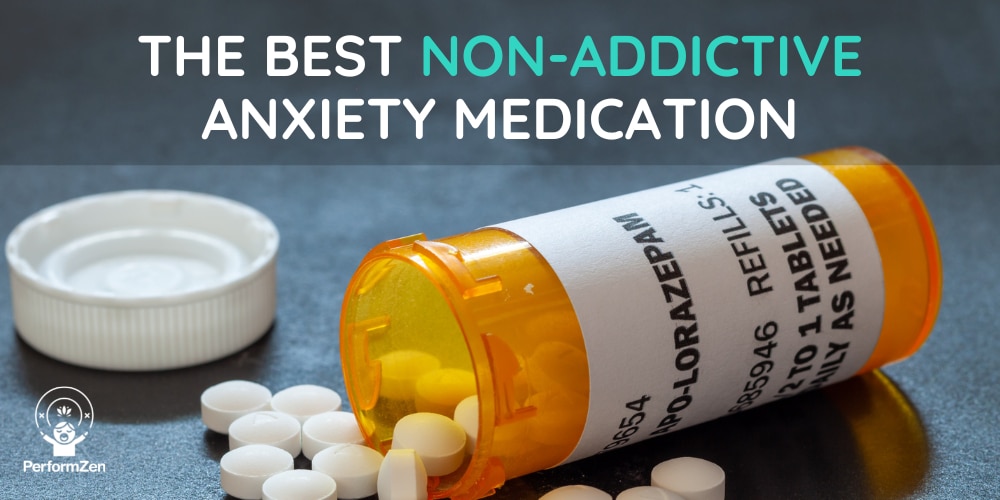Are you an anxiety patient and getting side effects from your current medication, so you are looking for a safe treatment? Or you want to know the non-addictive anxiety medication for your child? Well, in either case, you are in the right place.
Anxiety medications are usually sensitive and have the potential for addiction. Finding an effective yet non-addictive one can be trouble for you. That’s why we have come up with the 10 best non-addictive anxiety medications. You will learn about their mechanisms, benefits, and possible side effects in detail below. Let’s quickly start!
Beta Blockers:
It has been seen many times that people become anxious while their psychiatrist prescribes them medicines. Such people may suffer from fast heartbeat, restlessness and sweating. They are involved in behaviors such as tapping fingers and bouncing legs every time. They also avoid social situations. So, to overcome these symptoms and anxious behaviors , psychiatrists suggest beta blockers. Propranolol is the main ingredient in them that reduces feelings of anxiousness. It stops adrenaline release which prevents heart race at irregular times.
Beta blockers are commonly used to manage performance anxiety, social anxiety disorder, and other situational anxieties. These medications tend to be non-addictive and well tolerated. Although certain individuals may experience side effects like fatigue, dizziness, or cold hands and feet,.
Buspirone:
Buspirone is the second one on our list. It is an anxiolytic medication that works by modulating serotonin levels without leading to sedation or dependency. It helps to reduce anxiety while modulating serotonin levels without leading to dependency or sedation. It can take several weeks before its full therapeutic effect can be realized. Potential side effects include dizziness, nausea, and headaches, but these usually fade over time.
SSRIs (Selective Serotonin Reuptake Inhibitors):
SSRIs are third on our list. These are very reputable for their safety and effectiveness against anxiety disorders. Some of the reputable options are sertraline, fluoxetine, and escitalopram.
These work by inhibiting serotonin’s reuptake by blocking certain receptors on neurons that contribute to mood regulation. Increasing its levels can alleviate symptoms associated with anxiety and depression while being non-addictive enough for long-term use. Following are two of the most prescribed SSRIs in this regard.
Escitalopram:
Escitalopram is an SSRI medication that has proven to be highly effective at treating anxiety disorders. It is specifically rated very highly for generalized anxiety disorder and panic disorder. It works by increasing serotonin levels in the brain to create improvements in mood. Escitalopram is generally well tolerated and non-addictive. However, some individuals may experience side effects like nausea, insomnia, or sexual dysfunction.
Paroxetine:
Paroxetine is also an SSRI approved to treat various anxiety disorders. These include social anxiety disorder, panic disorder, post-traumatic stress disorder (PTSD), etc. Paroxetine works by increasing serotonin levels in the brain to produce mood improvements and a reduction in anxiety symptoms. It is also sold under the brand name Paxil.
SNRIs (Serotonin and Norepinephrine Reuptake Inhibitors):
The next ones we have are SNRIs. Some of the most commonly used SNRIs in this regard are venlafaxine and duloxetine. These effect both serotonin and norepinephrine receptors in the brain to increase serotonin and norepinephrine levels simultaneously.
These can be beneficial for people who don’t respond to SSRIs. These non-addictive medications are typically prescribed to treat generalized anxiety disorder, panic disorder, and social anxiety disorder.
Hydroxyzine:
Hydroxyzine is the next non-addictive anxiety medication on our list. It is usually prescribed off-label to treat anxiety and tension. It works by blocking histamine receptors in the brain to produce sedative and anxiolytic effects. Hydroxyzine is nonaddictive and may provide short-term relief from acute anxiety symptoms. But beware; its doses may cause drowsiness and cognitive impairment.
Gabapentin:
Gabapentin is an anticonvulsant medication often prescribed off-label for anxiety disorders. It works by modulating neurotransmitters such as gamma-aminobutyric acid (GABA). It is nonaddictive and may prove especially useful for individuals suffering from anxiety-related insomnia or neuropathic pain. Side effects of this medicine include dizziness, drowsiness, and weight gain.
Pregabalin:
The next non-addictive anxiety medication we are going to check out is pregabalin. It is an anticonvulsant medication approved for treating generalized anxiety disorder (GAD). It works by modulating neurotransmitters in the brain.
It is nonaddictive and may prove particularly helpful for individuals suffering anxiety-related pain or fibromyalgia. Common side effects may include dizziness, drowsiness, and weight gain.
Diphenhydramine:
Diphenhydramine is an antihistamine medication commonly prescribed for the treatment of allergies. It is also often taken off-label for treating anxiety disorders. It works by inhibiting histamine receptors in the brain to produce sedative and anxiolytic effects. It is very helpful for mild anxiety symptoms. But beware; higher doses can cause drowsiness and cognitive impairment.
Natural Anxiety Supplements:
Natural supplements have also been studied as potential anxiety reducers. These include herbal remedies like kava, passionflower, and valerian root, as well as magnesium and omega-3 fatty acid supplements.
These are generally safe, but it’s wise to speak to your healthcare provider before using them. It is because natural medications could potentially interact with existing prescriptions or cause side effects.
Tricyclic Antidepressants:
Tricyclic antidepressants like amitriptyline and nortriptyline may be prescribed when other medications have failed. They work by blocking the reuptake of neurotransmitters such as serotonin and norepinephrine to improve mood. Tricyclics are non-addictive but may cause more side effects compared to newer antidepressants, such as dry mouth, constipation, and weight gain.
Final Words
Wrapping it up, there are several non-addictive anxiety medications available. These are often more effective for younger people, for whom the common medications are not working or causing side effects. Selective serotonin reuptake inhibitors (SSRIs) are the best choice in this regard.
Consult your doctor to help you with selection for ensuring effectiveness and safety. Selecting safe medicine is essential, especially for children. It is essential to improve your mental wellbeing and the overall quality of your life.


